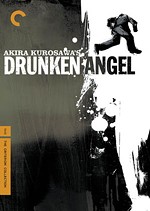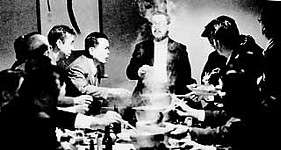Drunken Angel
NR, 98 min. Directed by Akira Kurosawa. Starring Michiyo Kogure, Toshiro Mifune, Takashi Shimura.
REVIEWED By Marjorie Baumgarten, Wed., July 12, 2000
Decades before Lucinda Williams turned the phrase “drunken angel” into a beautifully elegiac song for the departed musician Blaze Foley, the Japanese film maverick Akira Kurosawa used the phrase (Yoidore Tenshi, in Japanese) as the title for this 1948 gangster film. Set in postwar Japan, the movie tells the story of a good-samaritan doctor who has mixed feelings about ministering to a tubercular hoodlum. This early film in Kurosawa’s long career is the first time he worked with Toshiro Mifune, who was to become the director’s frequent leading man. Drunken Angel has also been cited by Kurosawa as the film in which the immature director finally “discovered” himself. We can all be grateful for that self-discovery, for it enabled Kurosawa to go on and direct some of the greatest films of the century (Rashomon, Seven Samurai, et al.)
A note to readers: Bold and uncensored, The Austin Chronicle has been Austin’s independent news source for over 40 years, expressing the community’s political and environmental concerns and supporting its active cultural scene. Now more than ever, we need your support to continue supplying Austin with independent, free press. If real news is important to you, please consider making a donation of $5, $10 or whatever you can afford, to help keep our journalism on stands.
Raoul Hernandez, Dec. 7, 2007
Marjorie Baumgarten, Dec. 7, 2000
Marc Savlov, Dec. 1, 2000
Drunken Angel, Akira Kurosawa, Michiyo Kogure, Toshiro Mifune, Takashi Shimura










